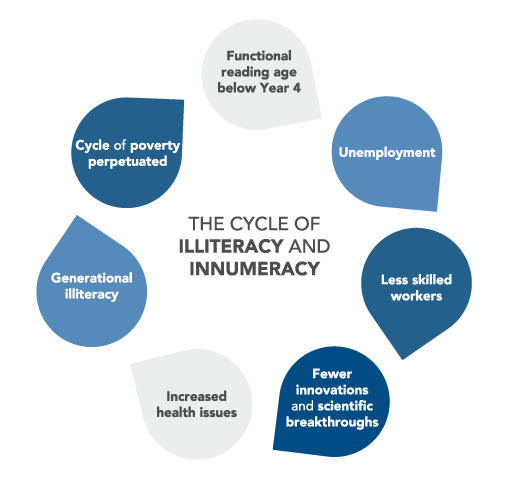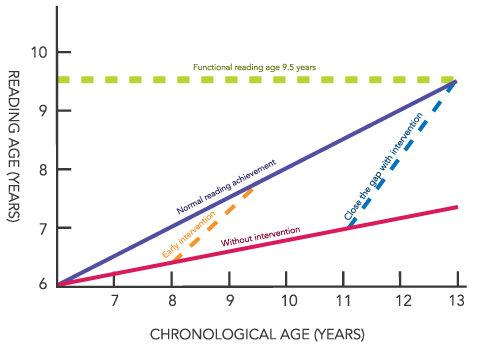Functional Literacy
A functionally literate reader is able to read well enough to operate in society, encompassing the level of literacy that enables a person to be trained in technical or trade courses. This functional reading level is generally considered to be equivalent to the level of reading competency expected of a child aged 9.5 years of age.
Attaining the minimal reading age is critical for a person to adequately function in society. Functional literacy provides the basic skills for a person to find employment and manage their day-to-day living needs.
US studies reports that two-thirds of all students who do not reach the minimal reading age are more likely to be supported by society and governments, rather than contributing to their community and economies. Studies have also shown that those who do not reach the functional reading age are more likely to become long-term unemployed or become part of the prison system.
Overlooked lowest achievers
Every year, at least 15-20 percent of school leavers head out of formal education without the basics of literacy and numeracy. Education systems are not designed to manage this 15-20 percent who have this difficulty. The traditional education system has accepted this failure rate, because there were low-skilled jobs for these people – until now. Educational resources need to be specific, well thought out and delivered in a step-by-step approach. They need to target and strengthen the root cause of the problem.
Otherwise this simply won’t work.
The illiterate and/or innumerate students cannot be trained to do any of the skilled tasks required today’s world. The government spends enormous amounts on vocational training that doesn’t work because the trainee doesn’t have basic literacy and numeracy skills. Governments spend tremendous amounts on unemployment and other social benefits. There is a very real possibility that these unskilled people will engage in anti-social behaviour, with gaols and the subsequent infrastructure that supports the criminal just system, also presenting a tremendous financial burden to governments.

Governments realise there is a problem, but very few have addressed the issue in a way that works. To continue to do more of the same will continue to produce the same results. Something different needs to be done as the problem will not go away. This is where the suppliers of shadow education or tutoring companies like Kip McGrath come in. Supplementary tutoring organisations specialise in helping students to improve their literacy and numeracy. They know how to teach these subjects in a way that works for poor performers.
Unlike schools, we understand accountability because we have to be accountable to parents who pay. There will be an increase in partnerships between governments and tutoring companies as a way of solving the unemployability of illiterate and innumerate people.
Why do our methods work?
This question is best expressed as "why does Kip McGrath succeed where others have failed?" There is nothing mystical or magical about our methodology. It is simple really. We don’t take a one size fits all approach to our teaching programmes and everything we do can be measured.
Accountability is the key. We pre-test each student to find out what is known as well as what isn’t known. This allows us to develop an individual programme for each student that builds upon the student’s strengths as well as targeting their weaknesses.
We set goals for each student. For example: to improve a reading age from 7.5 years to 9.5 years in 60 lessons. We use resources that are delivered in a step-by-step approach designed specifically to accelerate progress. It’s the small progressive steps that get big results.
All of our teachers are trained in our remediation methods and are accountable. We check each student’s learning programme to ensure that teachers are teaching the child well and to the child’s perfect level.

This graph illustrates the improvement a child can experience with remedial literacy intervention. Without intervention, the literacy gap widens as the child grows older. The likelihood of ever reaching a functional reading level without remediation is unlikely.
Overlooked lowest achievers
Every year, at least 15-20 percent of school leavers head out of formal education without the basics of literacy and numeracy. Education systems are not designed to manage this 15-20 percent who have this difficulty. The traditional education system has accepted this failure rate, because there were low-skilled jobs for these people – until now. Educational resources need to be specific, well thought out and delivered in a step-by-step approach. They need to target and strengthen the root cause of the problem.
Otherwise this simply won’t work.
The illiterate and/or innumerate students cannot be trained to do any of the skilled tasks required today’s world. The government spends enormous amounts on vocational training that doesn’t work because the trainee doesn’t have basic literacy and numeracy skills. Governments spend tremendous amounts on unemployment and other social benefits. There is a very real possibility that these unskilled people will engage in anti-social behaviour, with gaols and the subsequent infrastructure that supports the criminal just system, also presenting a tremendous financial burden to governments.

Governments realise there is a problem, but very few have addressed the issue in a way that works. To continue to do more of the same will continue to produce the same results. Something different needs to be done as the problem will not go away. This is where the suppliers of shadow education or tutoring companies like Kip McGrath come in. Supplementary tutoring organisations specialise in helping students to improve their literacy and numeracy. They know how to teach these subjects in a way that works for poor performers.
Unlike schools, we understand accountability because we have to be accountable to parents who pay. There will be an increase in partnerships between governments and tutoring companies as a way of solving the unemployability of illiterate and innumerate people.
Why do our methods work?
This question is best expressed as "why does Kip McGrath succeed where others have failed?" There is nothing mystical or magical about our methodology. It is simple really. We don’t take a one size fits all approach to our teaching programmes and everything we do can be measured.
Accountability is the key. We pre-test each student to find out what is known as well as what isn’t known. This allows us to develop an individual programme for each student that builds upon the student’s strengths as well as targeting their weaknesses.
We set goals for each student. For example: to improve a reading age from 7.5 years to 9.5 years in 60 lessons. We use resources that are delivered in a step-by-step approach designed specifically to accelerate progress. It’s the small progressive steps that get big results.
All of our teachers are trained in our remediation methods and are accountable. We check each student’s learning programme to ensure that teachers are teaching the child well and to the child’s perfect level.

This graph illustrates the improvement a child can experience with remedial literacy intervention. Without intervention, the literacy gap widens as the child grows older. The likelihood of ever reaching a functional reading level without remediation is unlikely.